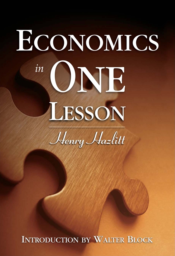

So we have finished with the broken window. An elementary fallacy. Anybody, one would think, would be able to avoid it after a few moments' thought. Yet the broken-window fallacy, under a hundred disguises, is the most persistent in the history of economics. It is more rampant now than at any time in the past. It is solemnly reaffirmed every day by great captains of industry, by chambers of commerce, by labor union leaders, by editorial writers and newspaper columnists and radio commentators, by learned statisticians using the most refined techniques, by professors of economics in our best universities. In their various ways they all dilate upon the advantages of destruction. Though some of them would disdain to say that there are net benefits in small acts of destruction, they see almost endless benefits in enormous acts of destruction. They tell us how much better off economically we all are in war than in peace. They see "miracles of production" which it requires a war to achieve. And they see a postwar world made certainly prosperous by an enormous "accumulated" or "backed up" demand. In Europe they joyously count the houses, the whole cities that have been leveled to the ground and that "will have to be replaced." In America they count the houses that could not be built during the war, the nylon stockings that could not be supplied, the worn-out automobiles and tires, the obsolescent radios and refrigerators. They bring together formidable totals. It is merely our old friend, the broken-window fallacy, in new clothing, and grown fat beyond recognition. This time it is supported by a whole bundle of related fallacies. It confuses need with demand. The more war destroys, the more it impoverishes, the greater is the postwar need. Indubitably. But need is not demand. Effective economic demand requires not merely need but corresponding purchasing power. The needs of China today are incomparably greater than the needs of America. But its purchasing power, and therefore the "new business" that it can stimulate, are incomparably smaller.🏁
Global Leaderboard
| # | Player | Time | Duration | Accuracy | WPM | pp | |
|---|---|---|---|---|---|---|---|
| 1 | |||||||
| 2 | |||||||
| 3 | |||||||
| 4 | |||||||
| 5 | |||||||
| 6 | |||||||
| 7 | |||||||
| 8 | |||||||
| 9 | |||||||
| 10 |


So we have finished with the broken window. An elementary fallacy. Anybody, one would think, would be able to avoid it after a few moments' thought. Yet the broken-window fallacy, under a hundred disguises, is the most persistent in the history of economics. It is more rampant now than at any time in the past. It is solemnly reaffirmed every day by great captains of industry, by chambers of commerce, by labor union leaders, by editorial writers and newspaper columnists and radio commentators, by learned statisticians using the most refined techniques, by professors of economics in our best universities. In their various ways they all dilate upon the advantages of destruction. Though some of them would disdain to say that there are net benefits in small acts of destruction, they see almost endless benefits in enormous acts of destruction. They tell us how much better off economically we all are in war than in peace. They see "miracles of production" which it requires a war to achieve. And they see a postwar world made certainly prosperous by an enormous "accumulated" or "backed up" demand. In Europe they joyously count the houses, the whole cities that have been leveled to the ground and that "will have to be replaced." In America they count the houses that could not be built during the war, the nylon stockings that could not be supplied, the worn-out automobiles and tires, the obsolescent radios and refrigerators. They bring together formidable totals. It is merely our old friend, the broken-window fallacy, in new clothing, and grown fat beyond recognition. This time it is supported by a whole bundle of related fallacies. It confuses need with demand. The more war destroys, the more it impoverishes, the greater is the postwar need. Indubitably. But need is not demand. Effective economic demand requires not merely need but corresponding purchasing power. The needs of China today are incomparably greater than the needs of America. But its purchasing power, and therefore the "new business" that it can stimulate, are incomparably smaller.🏁